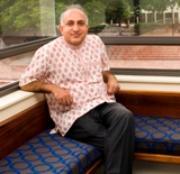
Researchers, academics and public intellectuals from across South Africa gathered at Rhodes University recently to celebrate 20 years of South African democracy by debating Africanisation and the transformation of South African higher education institutions.
The outgoing Vice-Chancellor, Dr Saleem Badat emphasised the role of Africanisation in the quest for transformation in the country, saying the two are inextricably linked. “The ideas of transformation and Africanisation are chapters of one book,” he said.
In his presentation titled “Africanisation and the transformation of the higher education curriculum in South Africa: Limits and possibilities” Prof Kai Horsthemke of the Wits School of Education said within the context of higher education institutions, Africanisation is generally understood to involve institutional transformation, and more specifically ‘decolonisation’ of higher education.
He referenced a 2003 meeting between former South African president Thabo Mbeki and vice-chancellors of institutions of higher education in South Africa. The meeting’s objective was to pave the way towards transformation by identifying critical issues and challenges in higher education in South Africa.
“It was in this context that the relevance and indeed the interrelatedness of African culture, African identity and African knowledge systems were articulated,” Prof Horsthemke said.
According to Prof Horthemke ‘Africanisation’ of higher education in South Africa is multi-dimensional and can involve at least four different kinds of transformations or changes including transformation reflecting the demographic profile of the country at all levels of the life in the institution; transformation of the syllabus or content; transformation of the curriculum; and transformation in terms of throughput rates and research profile. In the absence of feasible models the debate about exactly what the implementation of an Africanisation process would involve must continue, he added.
Prof Lesley le Grange of Stellenbosch University’s Faculty of Education called for more nuanced debate on the term ‘curriculum’ in his presentation “Currere’s active force and the Africanisation of the university curriculum”.
He argued that it is the school rather than the university, where curriculum receives the majority of attention in the field of Curriculum Studies, possibly due to the relative autonomy and academic freedom of higher education institutions.
He said this is a key moment in time to ask the key curriculum question: “What knowledge is of most worth to South African university students located on the African continent and part of a global society?”
By drawing on insights from the sociology of knowledge, indigenous knowledge and a different readings of the knowledge economy, he presented the idea that Africanisation of a university’s curriculum is dependent on understanding the active force of the term’s etymological root currere.
He noted significant changes in higher education institutions in South Africa over the last 20 years, including structural changes, the reorganisation of teaching programmes and the introduction of performativity regimes.
He highlighted three significant developments in the transformation of the university research system over the past two or three decades. These include the shift from science systems to global science networks, the capitalisation of knowledge and the integration of academic labour into the industrial economy, also known as the coming of the knowledge economy.
The reclamation and establishment of African knowledge is important, said Prof le Grange, because other than Africa’s oldest university, Egypt’s Al-Azhar, which is organised on its original Islamic model, all African universities have adopted a Western model of academic organisation. “African universities have been shaped by colonialism and organised according to European models or as authors on higher education, Damtew Teffera and Philip Altbach put it, ‘higher education in Africa is an artefact of colonial policies’”.
By Sarah-Jane Bradfield
